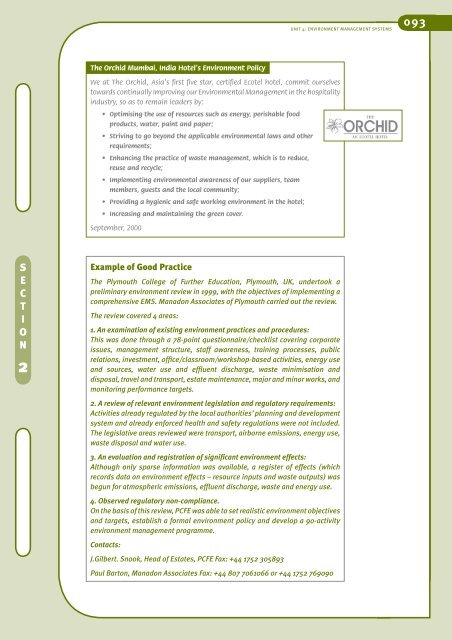Online version: PDF - DTIE
Online version: PDF - DTIE
Online version: PDF - DTIE
Create successful ePaper yourself
Turn your PDF publications into a flip-book with our unique Google optimized e-Paper software.
UNIT 4: ENVIRONMENT MANAGEMENT SYSTEMS<br />
093<br />
The Orchid Mumbai, India Hotel’s Environment Policy<br />
We at The Orchid, Asia’s first five star, certified Ecotel hotel, commit ourselves<br />
towards continually Improving our Environmental Management in the hospitality<br />
industry, so as to remain leaders by:<br />
• Optimising the use of resources such as energy, perishable food<br />
products, water, paint and paper;<br />
• Striving to go beyond the applicable environmental laws and other<br />
requirements;<br />
• Enhancing the practice of waste management, which is to reduce,<br />
reuse and recycle;<br />
• Implementing environmental awareness of our suppliers, team<br />
members, guests and the local community;<br />
• Providing a hygienic and safe working environment in the hotel;<br />
• Increasing and maintaining the green cover.<br />
September, 2000<br />
S<br />
E<br />
C<br />
T<br />
I<br />
O<br />
N<br />
2<br />
Example of Good Practice<br />
The Plymouth College of Further Education, Plymouth, UK, undertook a<br />
preliminary environment review in 1999, with the objectives of implementing a<br />
comprehensive EMS. Manadon Associates of Plymouth carried out the review.<br />
The review covered 4 areas:<br />
1. An examination of existing environment practices and procedures:<br />
This was done through a 78-point questionnaire/checklist covering corporate<br />
issues, management structure, staff awareness, training processes, public<br />
relations, investment, office/classroom/workshop-based activities, energy use<br />
and sources, water use and effluent discharge, waste minimisation and<br />
disposal, travel and transport, estate maintenance, major and minor works, and<br />
monitoring performance targets.<br />
2. A review of relevant environment legislation and regulatory requirements:<br />
Activities already regulated by the local authorities’ planning and development<br />
system and already enforced health and safety regulations were not included.<br />
The legislative areas reviewed were transport, airborne emissions, energy use,<br />
waste disposal and water use.<br />
3. An evaluation and registration of significant environment effects:<br />
Although only sparse information was available, a register of effects (which<br />
records data on environment effects – resource inputs and waste outputs) was<br />
begun for atmospheric emissions, effluent discharge, waste and energy use.<br />
4. Observed regulatory non-compliance.<br />
On the basis of this review, PCFE was able to set realistic environment objectives<br />
and targets, establish a formal environment policy and develop a 90-activity<br />
environment management programme.<br />
Contacts:<br />
J.Gilbert. Snook, Head of Estates, PCFE Fax: +44 1752 305893<br />
Paul Barton, Manadon Associates Fax: +44 807 7061066 or +44 1752 769090
















